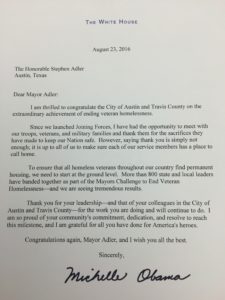
Today United States Secretary of Housing and Urban Development Julián Castro and Mayor Steve Adler announced that the U.S. Interagency Council on Homelessness, HUD, and the Department of Veterans Affairs are pleased to confirm that the City of Austin has effectively ended homelessness among veterans in Austin. This designation reflects the USICH’s confidence that Austin has built the infrastructure and systems that will ensure that any homeless veteran in Austin will quickly get the help he or she needs to get into a permanent home.
“We have a responsibility to ensure that once our veterans have served their nation, they have a safe, stable place to call home. Austin today has proven that ending veteran homelessness isn’t just aspirational – it’s achievable. I’m so proud to congratulate the city and its partners on working tirelessly to give our veterans a dignified home, setting an example for communities across the nation,” said HUD Secretary Julián Castro.
“We got to this community win today in a classic Austin way. We were innovative, creative and determined. There was great work already being done when this initiative started, but these efforts weren’t quite getting the job done all the way. We needed a new way, new partners, and a wider and renewed commitment,” said Mayor Steve Adler.
Additionally, the Mayor told the Secretary that local service and housing providers had committed to achieving HUD’s next goal, the end to chronic homelessness by the end of 2017. The chronically homeless are disabled people who have been homeless for at least a year or at least four times in the last three years.
 Then-Mayor Lee Leffingwell accepted the Mayor’s Challenge to End Veteran Homelessness in 2014 that was issued by First Lady Michelle Obama on behalf of HUD, the VA, and USICH. According to Ann Howard of the Ending Community Homelessness Coalition, a total of 682 veterans have been placed into permanent housing as a result of the initiative.
Then-Mayor Lee Leffingwell accepted the Mayor’s Challenge to End Veteran Homelessness in 2014 that was issued by First Lady Michelle Obama on behalf of HUD, the VA, and USICH. According to Ann Howard of the Ending Community Homelessness Coalition, a total of 682 veterans have been placed into permanent housing as a result of the initiative.
“As a veteran, it was my honor to accept First Lady Michelle Obama’s challenge to end veteran homelessness. I am honored and gratified to see the community rally around this mission, and I’m grateful to Mayor Adler for getting us across the finish line,” said former Mayor Lee Leffingwell.
The USICH definition of functional zero means that:
- No chronically homeless Veterans or Veterans are in the process of being housed in 90 days
- For Veterans refusing to be housed, plan for continual outreach and a resource will be available when choose to be housed
- On average, homeless Veterans are housed within 90 days of being identified
- The number of Veterans being housed is greater than the number becoming homeless (monthly)
- The number of Veterans entering in transitional housing is less than the number becoming homeless (monthly
“The progress achieved in Austin and across the nation toward the goal of ending Veteran homelessness reflects the power of productive partnerships in solving national problems,” said U.S. Secretary of Veterans Affairs Robert A. McDonald. “The dramatic decline in Veteran homelessness in recent years has occurred because federal, state and local partners are more effectively synchronizing services and identifying Veterans in need. For its part, VA is serving more Veterans than ever before with heath care, education, job training, and wraparound supportive services. I am proud of all that we have achieved as a nation in the effort to prevent and end Veteran homelessness, but we at VA will not rest until every Veteran has a place to call home.”
Beginning in May 2015, Mayor Adler began convening regular meetings to tackle veteran homelessness. The stakeholders included his staff members as well as representatives of Senator Kirk Watson’s office, the Austin Apartment Association, the Austin Board of Realtors, and the Austin Chamber of Commerce, as we advocates and service providers such as ECHO, Caritas, the VA, the Housing Authority of the City of Austin, Front Steps, the Salvation Army, and Goodwill of Central Texas. Additionally, he created the Housing Heroes Fund to provide financial assurance to housing providers. To date, that Fund has raised $373,000.
“It was a community effort to end veterans homelessness in Austin, and I’m proud of the good work we did to achieve our shared goal. I am hopeful this is just the beginning of our community’s dedication to ensuring everyone has somewhere to call home,” said Senator Kirk Watson.
Additionally, when the Austin community had an opportunity to access $3 million dollars over three years of VA funding, to bring much-needed resources to help tackle helping homeless veterans, our local homeless provider Front Steps took the lead and put together a collaborative approach and was successful. These funds have significantly helped many veterans get into housing.
The drive to end veteran homelessness in Austin has inspired ongoing efforts that will survive the Mayor’s Challenge to End Veteran Homelessness. The Austin Homeless Veterans Initiative will continue its work, leveraging local and state funding to support local efforts.
The Housing Authority of the City of Austin (HACA) recently issued a request for proposals from qualified developers/owners to receive an allocation of Project Based HUD-Veteran Affairs Supportive Housing Vouchers (VASH). The purpose of this allocation is to enable homeless veterans to access affordable housing with an array of supportive services. The project based voucher program allows public housing agencies that already administer a tenant-based voucher program under an annual contributions contract with HUD to take up to 20 percent of its voucher program budget authority and attach the funding to specific units rather than using it for tenant-based assistance. Project-basing additional VASH vouchers will strengthen the current system the city has in place to provide affordable housing for homeless veterans.
“I’m pleased that HACA, one of the highest performing public housing agencies in the country, contributed $25,000 seed money to the city’s fund to help bring more property owners into the fold,” said HACA President and CEO Michael Gerber. “We are also excited that HACA has released a request for developer partners to build additional units for veterans, making full use of VASH voucher opportunities. The only way we can prevent a return to homelessness is to continue to attract landlords to house vets and continue to build dedicated units to house those who have served our country.”
Finally, local volunteers have partnered with Whole Foods to organize Red, White and Blues 512 ~ House Our Heroes, a blues benefit the Housing Our Heroes Fund. Organizers of the festival, which is planned for Nov. 13, will say they will announce the lineup by the end of the month.
-30-

3 comments
Comments are closed.